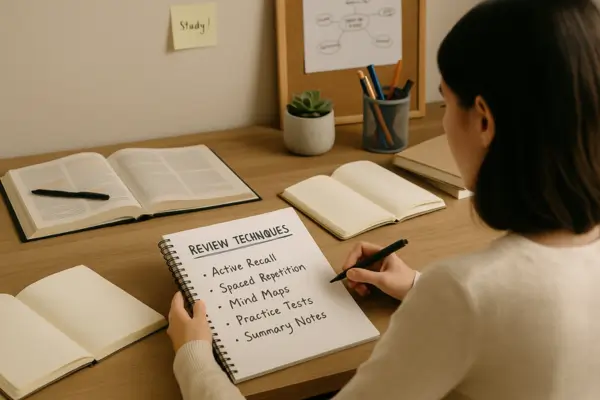Reviewing is one of the most critical parts of preparing for a public exam. However, many candidates mistake reviewing for simply rereading notes or textbooks, which is not enough.
To truly fix knowledge into long-term memory and retrieve it confidently during the exam, you must use smart, active review strategies. In this article, we’ll dive into powerful review techniques that actually work and can make the difference between passing and failing your public exam.
Why Reviewing is Essential
Studying a topic once is never enough. Our brains naturally forget information over time — this phenomenon is called the forgetting curve. Regular review:
- Reinforces learning.
- Strengthens memory recall.
- Clarifies misunderstandings.
- Boosts confidence before exam day.
Without structured review sessions, much of what you learn will fade away.
Effective review strategies help fight forgetting and turn short-term knowledge into permanent understanding.
Start with Active Recall
Active recall is arguably the most effective review technique.
Instead of passively reading or highlighting, active recall forces your brain to retrieve information without looking at the material.
Ways to practice active recall:
- After studying a chapter, close the book and write down everything you remember.
- Quiz yourself with flashcards.
- Answer past paper questions without consulting notes.
By actively pulling information out of memory, you strengthen neural connections and deepen your understanding.
Use Spaced Repetition to Fight Forgetting
Spaced repetition involves reviewing material at gradually increasing intervals. Instead of cramming information all at once, you space your reviews over days and weeks.
Example schedule:
- Day 1: Learn the topic.
- Day 2: First review.
- Day 5: Second review.
- Day 12: Third review.
- Day 30: Fourth review.
Apps like Anki or Quizlet are great for automating spaced repetition with flashcards.
This technique matches how our memory works naturally, making learning more durable.
Practice with Past Papers
Solving previous exam papers is one of the smartest forms of review:
- It familiarizes you with the format and style of questions.
- It helps you manage time effectively.
- It highlights weak areas for targeted revision.
Approach past papers like real exams: set a timer, work in a distraction-free environment, and evaluate your performance critically afterward.
Summarize and Reorganize Information
Summarization forces you to condense large chunks of information into concise notes, strengthening your grasp of the material.
Tips for effective summarization:
- After studying a topic, write a one-page summary in your own words.
- Create mind maps that visually link related concepts.
- Use bullet points, charts, and tables to simplify complex information.
Reorganizing material also reveals gaps in your understanding, giving you a clear guide for further review.
Teach the Material to Someone Else
If you can explain a concept clearly, you truly understand it.
Teaching is a powerful form of review because it requires you to retrieve, organize, and present information coherently.
Options to practice teaching:
- Explain concepts to a family member or friend.
- Record yourself giving a short lecture on a topic.
- Teach an imaginary audience if no one is available.
You’ll quickly notice which areas you know well and which need more work.
Mix Up Your Subjects
Many candidates fall into the trap of reviewing subjects in big, isolated blocks (e.g., a whole day of just math).
A better method is interleaving — mixing different subjects or topics within a study session.
For example:
- 30 minutes of math
- 30 minutes of English grammar
- 30 minutes of general knowledge
Mixing subjects keeps your brain active, improves problem-solving skills, and strengthens memory associations.
Focus on Mistakes, Not Just Strengths
During review, it’s tempting to keep practicing the subjects you’re already good at. But real progress comes from tackling your weak spots head-on.
After each practice session:
- Analyze mistakes carefully.
- Understand why the mistake happened (lack of knowledge, carelessness, misinterpretation?).
- Review the underlying concept immediately.
Turning mistakes into learning opportunities accelerates improvement.
Incorporate Visual and Auditory Reviews
Different senses can reinforce memory better than text alone.
Try these techniques:
- Watch educational videos summarizing key topics.
- Listen to audio recordings or podcasts while commuting.
- Draw diagrams, timelines, or flowcharts to visualize information.
Using multiple learning styles helps create stronger, more diverse memory paths.
Schedule Weekly Comprehensive Reviews
In addition to daily topic reviews, set aside one day per week for a full review session.
Weekly review plans could include:
- Solving a full-length mock exam.
- Re-reading summary notes and mind maps.
- Revisiting mistakes made during the week.
- Reviewing flashcards rapidly.
These sessions refresh your memory, integrate different topics, and prepare you mentally for exam pressure.
Stay Consistent Over Time
Reviewing effectively is less about intensity and more about consistency.
A little review every day is far superior to a marathon session right before the exam.
Tips for building consistency:
- Set a fixed daily review time (e.g., 30–60 minutes every evening).
- Use a tracking sheet to record topics reviewed.
- Reward yourself for maintaining your review habit weekly.
Long-term consistency is the secret weapon that top exam performers rely on.
Final Thoughts: Review Smarter, Succeed Faster
Effective review techniques are not about working harder — they’re about working smarter.
By practicing active recall, using spaced repetition, focusing on your mistakes, mixing subjects, and staying consistent, you transform your preparation from average to outstanding.
Smart, strategic reviewing ensures that when exam day arrives, you’re not just hoping you remember — you know you will.
Success doesn’t just belong to those who study the most — it belongs to those who review the smartest. 🚀

